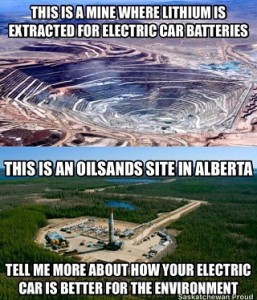Alberta Tar Sands and Lithium Ion Batteries: A Case Study in Deception

So many people are being led around by the nose with pure baloney; it’s frightening. No wonder the US political system has fallen to this point, given the amazing volume of disinformation and the force of the relentless propaganda.

There are many deceptions around us and too few are trained with too little skills at detecting such bias. This is one reason why, even though I enjoy what science has clarified for us, have enjoyed the recent piece by John Oliver on “Science.” https://www.youtube.com/watch?v=0Rnq1NpHdmw
Oh c’mon Craig,
How on earth do you conclude that this is an example of the “US political system has fallen” or ” relentless propaganda ” ?
The article you are citing is from the Daily Kos, a relatively obscure online publication and is complaining about publication of material from an even more obscure source.
The fact that some very strange, inaccurate and just plain weird information is available on the internet is neither new nor a cause for concern. Long before the internet US media has a long history of weird publications , some make tabloid publications like the National Enquirer etc positively conservative !
This sort of nonsense is not the sign of the collapse of the US Political System, just the irritating by-product of maintaining a free media.
If anything, it’s evidence that the US First Amendment is intact, and the US political system still provides it’s citizens, and the world with the ‘Beacon of Liberty’ a free press provides.
Nor is the Daily Kos article entirely correct. Lithium is extracted by two methods, extraction from salt lakes and conventional (hard rock)ore mining. Both methods are environmental hazardous. In addition working conditions for miners in Bolivia and China have attracted wide-spread criticism.
Lithium mining will soon reach a stage where the cost of extraction and scarcity of supply will necessitate finding new materials for EV battery manufacture.
The environmental impact of mining and processing of materials for new technologies such as neodymium and yttrium rare earths for the magnets used in wind turbines, gallium and indium for solar panels and energy-efficient lighting, along with many other materials will become increasingly controversial as extraction processes attract greater scrutiny.